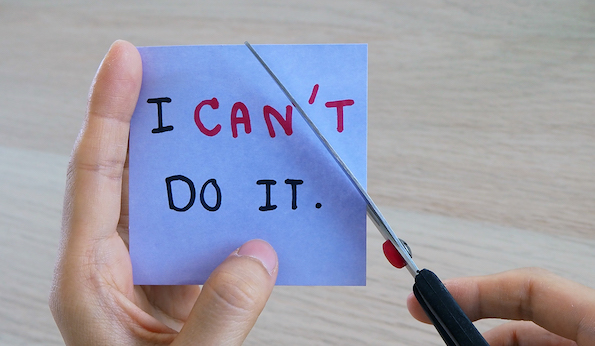
Most people, at some time, have felt unsure about themselves or doubted their abilities. Often this takes the form of ‘lacking confidence’ or being ‘under-confident’. In some people, this can become a mantra which holds them back from realising their potential. At an even more basic level, feeling under-confident can mean weaker social ties and poorer prospects in relationships, career, even in Life itself.
But there’s another way of looking at this problem of low confidence.
First, let’s consider a few key ideas about confidence:
- We are all confident to some degree, about some things. Many of these we overlook and take for granted.
- Success builds confidence, not the other way round.
- Successful people often don’t feel confident, but that doesn’t stop them being successful.
- Self-esteem is not a birth-right, that too has to be learned and earned.
- If you are blaming a lack of confidence for lack of progress, you are probably wrong. Lack of confidence might be your explanation, but not the cause.
- While you are waiting to become confident, a lot of things don’t get done and time is wasted.
- While you are waiting to become confident, you can at least get on with it and maybe confidence will grow out of that.
- Plan well, start small, stop listening to doubt, and you’ll get there.
- The skills can be developed, or if necessary, learned. Like any development, it will need commitment and even a little discomfort.
A definition of confidence
Confidence is a concept that includes a number of different aspects of our experience. In the sense that is it being used here confidence is the ability to feel safe and secure enough to act in a certain way. We say we are under-confident when we feel uncertain or unsure about something, or when it feels unsafe to proceed.
Author and psychologist Daniel Goleman’s definition of confidence is “A strong sense of one’s self-worth and capabilities”. Looked at from this perspective, developing confidence goes hand-in-hand with valuing yourself and feeling that you are capable.
To move from a state where you lack confidence, to a place where you feel “safe and secure enough to act in a certain way” means an element of risk. Confidence is built on success, and you won’t have success if you are held back by those old doubts.
So, if you want to raise your level of confidence, start by recognising your abilities and strengths, and by doing things which create a sense of achievement. Those first few steps might feel uncomfortable, but do it anyway.
Abilities, strengths and achievements
We all have talents, skills and abilities. Even the person who is filled with self-doubt has some positive qualities they have overlooked.
Unfortunately, recognising our good points doesn’t come naturally (in some cultures, it is actively discouraged). Coupled with that, most of us have a tendency to focus too much on our perceived mistakes and failings. Both of these can discourage self-belief and recognition of our self-worth. Worse, they can develop into habits of thinking which become self-fulfilling prophecies.
Where to start?
The first step is to accept yourself uncritically. The last thing you need is to carry around an internal critic who is constantly judging you. Self-acceptance means saying “OK, I am what I am”, without allowing negative or judgemental thoughts to creep in and swamp you.
To increase your confidence a good starting point is to make an inventory of the things you are good at. These may be skills you learned in childhood, or more recently acquired talents. There are surely some you have forgotten about. Revisit these skills often and do more of the things that make you feel positive about yourself.
Confidence is built on success, so anything that you are capable of that made you feel good at the time can bolster your sense of self-worth.
This inventory can also include your character strengths, so ask around; what do others appreciate in you. If you need help, use the VIA Character Strengths Survey.
Next, learn to appreciate the dozens of daily successes you have. These don’t have to be major achievements. It’s all about realising the wealth of self-affirming things you do each day but which you overlook. Training your mind to look out for your daily successes can start to counter the habit of focussing on perceived shortcomings or failures.
For the same reason, learning new things develops new skills and shifts the mind away from self-criticism, and opens it to growth. Mastering something new feeds directly into confidence, and indirectly it allows your mind to focus on possibilities.
Once you have made the decision to do what it takes to become more confident, a simple summary of the steps to take is:
- Do things that make you feel more confident about who you are
- Train you mind towards accepting yourself as you are
- Learn to recognise and appreciate your daily successes
- Find opportunities for new learning and personal growth.
Push yourself
Confident people have bad days and doubt themselves too, but they don’t let this stop them. If necessary, they push themselves to take the steps that they must take to reach their goals and ambitions.
Becoming more confident is not an intellectual exercise, it is about taking action. You have to push yourself a little to get past the doubts, fears and uncertainties that have been holding you back.
Learning anything new takes a little time and repetition. Inevitably, it also feels a little strange and even uncomfortable. Such discomfort isn’t a reason to stop, it is proof that you are moving into something new. As you confidence increases you’ll forget all about it as look toward your new horizons.
My Exclusive Offer
Sign up for the latest offers and I’ll send you FREE ACCESS to my class Boost Your Confidence and Overcome Self-Doubt.







